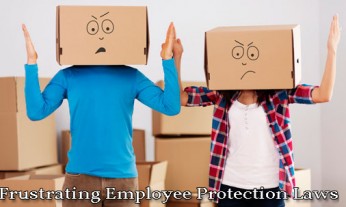 A guide to some of California’s most frustrating employee protection laws. While California is typically considered one of the most worker-friendly states in the U.S., the flip-side is that many employers operating within the state believe that California’s employee-protection laws are onerous and complicated to understand. In fact, employers who operate in California as well as other states have noted how the laws within this state are frustrating to comply with, especially when compared to more business-friendly jurisdictions. What employers have been confounded by is the administrative burdens, the lack of flexibility with regards to compliance and enforcement, and also the enhanced degree of litigation possibilities. The California Chamber of Commerce decision to enact 24 additional new state employment laws and amendments will go into effect starting in 2015, which will provide additional procedures and regulations that employers must adhere to. The following includes the four most difficult and frustrating employment laws that both California employers and employees should be aware of in order to avoid violations and to be fully informed about employee rights.
A guide to some of California’s most frustrating employee protection laws. While California is typically considered one of the most worker-friendly states in the U.S., the flip-side is that many employers operating within the state believe that California’s employee-protection laws are onerous and complicated to understand. In fact, employers who operate in California as well as other states have noted how the laws within this state are frustrating to comply with, especially when compared to more business-friendly jurisdictions. What employers have been confounded by is the administrative burdens, the lack of flexibility with regards to compliance and enforcement, and also the enhanced degree of litigation possibilities. The California Chamber of Commerce decision to enact 24 additional new state employment laws and amendments will go into effect starting in 2015, which will provide additional procedures and regulations that employers must adhere to. The following includes the four most difficult and frustrating employment laws that both California employers and employees should be aware of in order to avoid violations and to be fully informed about employee rights.
The Four Most Confusing California Employee Protection Laws
- Overtime: While in many states overtime cannot be paid until after over 40 hours have been worked by the employee, in California employees are entitled to overtime pay when they work more than 8 hours in one single day. This law has confused many new employees and employers because its effects reach beyond just overtime pay. Under the law, employees are prevented from having the flexibility to work late or leave early and subsequently make up the hours later during that same workweek without their employer being required to pay overtime wages.
- Employee Breaks: California has extremely strict requirements for employee breaks. In fact, employers are required to provide employees with both a 30-minute meal break per every five hours of work, plus a 10-minute rest break for every four hours of work. This law has resulted in a great deal of class actions against employers, especially the section about the 10-minute rest break, which is a requirement not provided by many other states. A 2012 decision clarified the 10-minute rest break requirement, holding that employers did not have to relieve their workers of all of the work duties during the break. However, this rule has been difficult for employees who would simply like the flexibility to skip their rest break in order to take a longer lunch. While employers would like to provide their employees with the flexibility to do so, fear of litigation prevents such employers from providing this leniency.
- Layoffs: California state law requirements for layoff reporting are some of the most stringent in the country. While federal law requires 60-day notices before any layoffs for those employers with over 100 full-time workers, California law requires the same notice from employers that have 75 or more part-time and full-time employees.
- Employment Contract Non-Compete Agreements: Non-compete agreements provide employers with protections and prohibit employees from soliciting their employer’s clients after the employment relationship is terminated, or taking other actions that place the employees in direct competition with the employer. While in many states non-compete agreements in employment contracts are enforceable, in California non-compete agreements are not valid.
The above is not a completely exhaustive lists of all of the California laws that are difficult to understand and comply with. However, understanding the basics of these laws will keep employers out of trouble and allow employees to understand their basic rights. When you need labor and employment law legal assistance, make sure to contact the labor and employment attorneys at Beck Law, P.C. in Santa Rosa, California.
